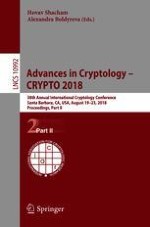2018 | OriginalPaper | Buchkapitel
Yet Another Compiler for Active Security or: Efficient MPC Over Arbitrary Rings
verfasst von : Ivan Damgård, Claudio Orlandi, Mark Simkin
Erschienen in: Advances in Cryptology – CRYPTO 2018
Aktivieren Sie unsere intelligente Suche, um passende Fachinhalte oder Patente zu finden.
Wählen Sie Textabschnitte aus um mit Künstlicher Intelligenz passenden Patente zu finden. powered by
Markieren Sie Textabschnitte, um KI-gestützt weitere passende Inhalte zu finden. powered by



